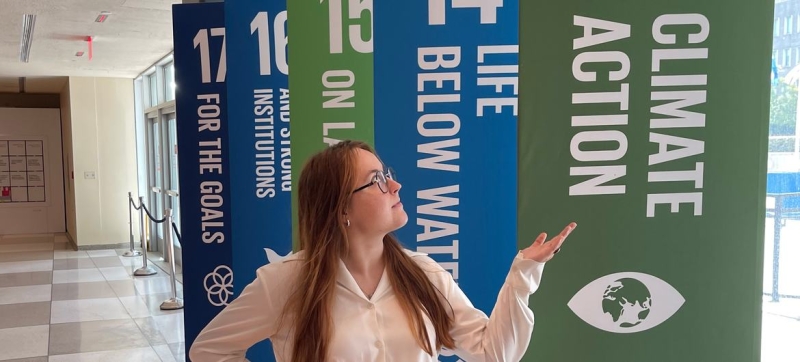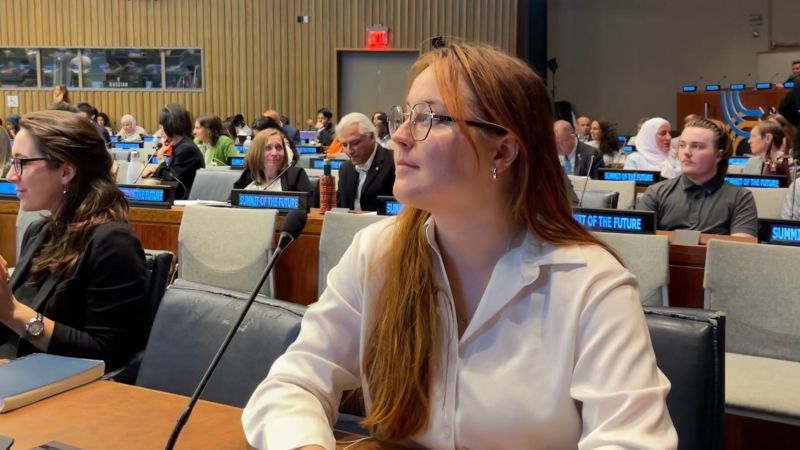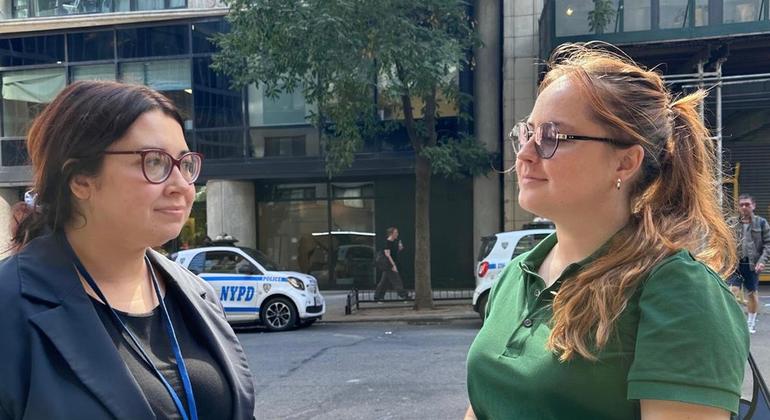
Climate blogger and consultant at Climate Investment Funds Daria Chekalskaya. INTERVIEW | Young eco-activist: You need to talk to young people about climate change in their language Climate and Environment
Climate blogger Daria Chekalskaya has gone from creating a page on social media to participating in high-level diplomatic dialogues, including coming to New York for the Future Summit. In an interview with Evgenia Kleshcheva from the UN News Service, she explained what attracts her to this work and shared her thoughts on how the UN and other international organizations can engage young people in the fight against climate change.
EK: Tell us about yourself and how you came to your field of activity.
DC: I have been working on climate change issues for about six years. When I moved to Finland and enrolled in environmental engineering, I discovered the wonderful world of sustainable development and chose the topic of climate because it seemed to me quite controversial at the time, not very clear and somewhat abstract. I decided to help others understand this topic and started a blog on Instagram, which at that time fit into the agenda quite well, because few people were talking about climate change, and sustainable development was just starting to enter the Russian-speaking space.
We were able to create a lot of information projects – from short videos, podcasts to an eco-school – that told people what climate change is, planetary boundaries, anthropocenes and other phenomena that you need to know about if you want to understand the fundamental picture. And at some point I realized that not only we as individuals, consumers, should influence the agenda, but we also need to have an active civic position and somehow interact with the system.
This can be done through various professions, you can help your business become more environmentally friendly, but as a person who works in communications, I decided to take an interest in diplomacy in order to better understand how the UN systems work, what framework conventions there are, how it all functions, how countries can agree among themselves in order to then pass these systemic changes from the top down. To figure it out for myself, to understand, to see everything with my own eyes and then to tell people in simple language what it is, how it works, why it is important, and what, in fact, they can count on in this topic.
EK: How can the UN and other multilateral organizations attract more youth and promote meaningful participation of young people?
DC: This is, by the way, a question I often brought up at events, because I am interested in best practices of how different organizations are trying to engage young people now, especially the less privileged. One way or another, I think the most important mechanism is social media now, because young people are constantly there.

Daria Chekalskaya at the Summit of the Future.
For example, I am often asked why I maintain my platforms on social networks and not on the website, and the answer is quite simple: because you have to go to the website, it is a very “old school” system, you have to understand that there is some website, and you have to go to it. And social networks are content that comes to you. Therefore, it seems to me that we need to create more attractive content that is generated, in fact, by young people, for young people, so that everything can be explained simply.
It seems to me that entering this topic can be difficult because there are a lot of terms, pompous speech, which is not always necessary to explain what is happening. And this is also such a high entry threshold, so if you simplify the information a little where possible and address your target audience in the language they speak, rather than using professional “jargon,” then you can reach out to young people.
EK: What would you like to say to world leaders?
DC: After five years of observing all the negotiations, I realized that I don’t have any specific message for any specific leader, because it’s such a complex system, and there are so many things that they’re trying to take into account, that it’s really difficult. I understand as a human being that it’s hard to take into account the interests of the whole society. Creating a democratic process is hard. So I always think that we should work and deal with these issues within the framework of our topic, which we are talking about or which we specialize in.
For me, it’s climate communications, education, so I always try to guide people within my capabilities, so to speak, so that they can explain what they are doing, why it is important and what needs to be done.

Recently, the Pact was adopted in the name of future, but, if you walk through the streets of New York, five minutes from the UN headquarters, no one will tell you what it is, why it is important, what it looks like, and what it is for. That is, everything is very difficult to understand, and we need clear levers.
It seems to me that it is important here that after global events each person returns to their communities and can convey, for example, three specific actions – what needs to be done and what is really important.
EK: Can you give an example of effective actions by an ordinary member of society?
DC: Ordinary people are also segmented. I work with people who are ordinary, but they are interested in the topic of sustainable development. I am often asked where to study? How to become an eco-engineer? How to become a science communicator? I always say that it is not necessary to choose a career path by a beautiful name – you saw some cool name and immediately wanted to repeat it.
No, you can stay within your interests and look for ways, because there are a lot of opportunities. You can be a designer and do design for some NGO that helps businesses calculate their carbon footprint. You can be a manager. That is, it is not necessary, I think, to become someone. You can look for this ecology within yourself and within your interests.
EK: What do you expect from the upcoming Climate Summit?
DC: It’s probably cool to still be a representative of the youth in this matter, because when you’re young, you have faith. I often discuss this with my colleagues, and they They tell me that the summit in Azerbaijan can already be buried as a successful CS. It hasn’t even started yet, and they are already burying it.
Read also:
INTERVIEW | Baku is preparing to host the largest global climate conference
As a representative of the younger generation, I still believe to the end that we will make progress. This is an event that all companies prepare for every year, and that is worth something.
So many resources are spent during the six months leading up to the CS in order to write speeches, figure out who, where and how will speak. I think that it should still play some role in this system.
EK: What would you say to other young people now?
DC: Be persistent, because youth does give you this little indulgence: you can dream, you can imagine anything, you can think about becoming anyone, you have a ton of opportunities and you don’t have this fear of the system. And I would never have thought that I would have access to these high-level events, and be able to sit down with some heads of state.
But inside there is this feeling – why not try. I can have a place here, I have something to say, I have a voice and I can be here.
